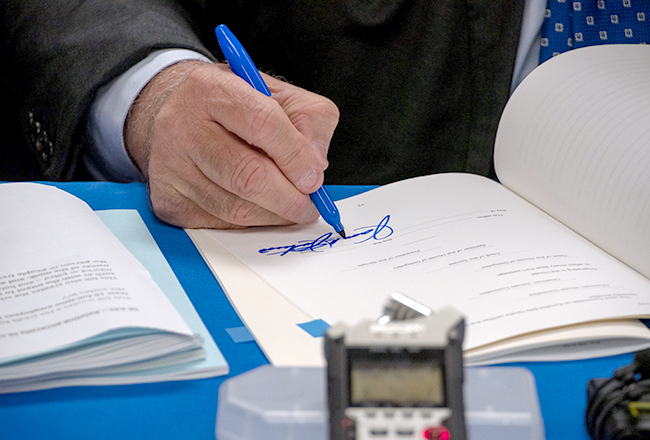West Virginia Governor Jim Justice Signs Steam Coal Severance Tax Cut Into Law at Murray Energy Mine

By Steven Allen Adams
March 28, 2019 - Beating the buzzer by several hours, West Virginia Governor Jim Justice on Wednesday signed and vetoed the remaining bills passed during the 2019 legislative session.
According to the governor’s website, Justice signed 24 bills Wednesday and vetoed 27 bills before the midnight deadline Wednesday. In total, Justice signed 266 bills and vetoed 29 bills passed by the state Senate and House of Delegates between Jan. 9 and March 9.

West Virginia Gov. Jim Justice signs coal mine legislation during a ceremony at Murray Energy Corp.’s Marion County Mine.
During a signing ceremony at a Murray Energy-owned coal mine in Marion County on Wednesday afternoon, Justice signed House Bill 3142, lowering the severance tax rate on steam coal used in power plants from 5 percent to 3 percent over the next three fiscal years. Justice also signed House Bill 3144, which gives tax credits to encourage the reopening or expansion of coal mines, and Senate Bill 635, making changes to laws regulating coal mining.
“This is our moment to put our stake in the ground and say, ‘By God, we’re not going to go quietly into the darkness,'” Justice said. “At the end of the day we want to grow our mining jobs.”
Justice vetoed a bill that would have eliminated the requirement for low-producing wells to pay natural gas and oil severance taxes. House Bill 2673 would have diverted those tax revenues to a fund for plugging abandoned natural gas and oil wells.
“The goal of providing additional needed funding to the Department of Environmental Protection to plug abandoned oil and gas wells and reclaim property disturbed by the plugging is a goal that needs to be pursued and achieved,” Justice said in his veto letter. “However, this needed funding should come from general revenues.”
One of the bills signed into law Wednesday was Senate Bill 622. The bill raises the campaign finance donation caps for candidates, political parties and political action committees to match federal levels, and puts in place additional reporting requirements for increased transparency.
Secretary of State Mac Warner thanked the governor for signing the legislation into law.
“I applaud the governor and the legislative leadership’s enthusiasm to strengthen public disclosure and transparency for the people of West Virginia by passing the campaign finance transparency reform bill,” Warner said in a statement.
“These are long overdue upgrades for West Virginia’s campaign finance laws.”
While Justice signed House Bill 2538 Tuesday, allowing banking institutions to bid to manage fees, penalties and taxes generated by the state medical cannabis program, he vetoed a bill that would have changed the licensing and tax structure for businesses wishing to get involved with medical cannabis.
House Bill 2079 would have allowed a business wishing to grow, process and dispense medical cannabis to hold one license instead of applying for three separate licenses.
“The governor’s veto of this legislation effectively means suffering people will not have access to treatment and the promise of jobs, investment and additional tax revenue that would have come with the passage of the bill … ,” said Delegate Mike Pushkin, D-Kanawha. “While I’m grateful that the governor signed the Cannabis Banking Act, without this legislation, cannabis business accounts will remain empty, suffering people will remain untreated, and badly needed tax revenue will go unrealized.”
Senate Bill 3, the Broadband Access Act, was signed by Justice Wednesday. It’s meant to encourage expansion of high-speed broadband internet to underserved areas by encouraging construction of towers, adding wireless devices to power poles and allowing internet companies to use state rights-of-way.
“For far too long, West Virginia has lagged behind in the development and installation of high-speed internet and wireless technologies,” House Speaker Roger Hanshaw, R-Clay, said.
“We are transforming West Virginia from a laggard to leader in finding innovative ways to encourage, invest in and develop leading-edge broadband infrastructure technologies that will benefit all our citizens.”
Several of Justice’s vetoes included bills meant to improve secondary roads in the state. House Bill 3044 would have required the Division of Highways to develop a new funding formula to use when allocating state and federal funding to counties for road maintenance.
Senate Bill 522 would have allowed the Division of Highways to use pay-as-you-go money collected from increased tax revenue and DMV fees for secondary road maintenance in counties.
In his veto message, Justice said that the latter bill violates the separation of powers between the legislative and executive branches.
SB 522 would have required the DOH to consult with legislators in their districts when putting together lists for secondary road maintenance.
“The purpose of the bill, while well-intentioned, is problematic because it represents a legislative encroachment into executive functions,” Justice wrote. “Maintaining our state and secondary roads system, including assigning priority to particular projects, is without question an executive function.”
Justice has unveiled an initiative similar to SB 522, using pay-as-you-go money to fund secondary road maintenance and equipment purchases, as well as using a portion of the $913 million available from the first round of Roads to Prosperity bonds.

